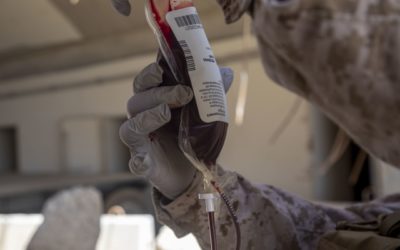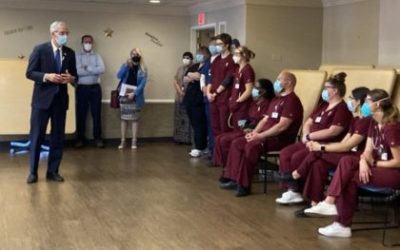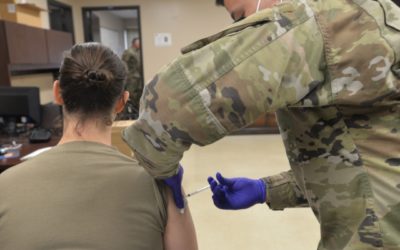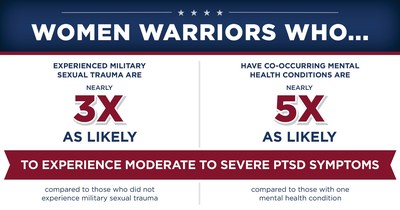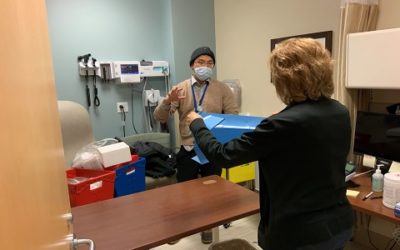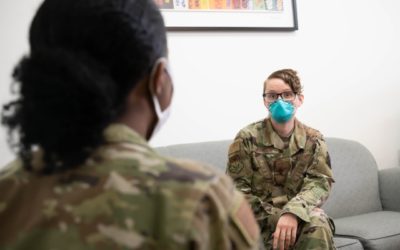The James A. Lovell Federal Health Care Center in Chicago is the only joint DoD/VA healthcare facility in operation—a partnership between VA and the Navy. With a gentle push from Congress, that might change in the not-too-distant future.
Fresh Whole Blood Transfusion Improves Outcomes in Military Settings
For much of the history of modern medicine, whole blood was the best—and only—option for patients needing transfusion after surgery or major trauma.
Invasive Fungal Infection Remains a Serious Risk in Acute Myeloid Leukemia
Invasive fungal disease (IFD) is a highly morbid complication in patients with hematologic conditions including acute myeloid leukemia (AML), whose risk is increased due to both the disease itself and the treatments for it.
Survey: VA EHR Deployment Drove Down Staff Morale at Spokane VAMC
Despite lingering problems with the deployment of its new electronic medical record system at the Mann-Grandstaff VAMC in Spokane, VA, officials said the department is still on track to deploy the system in Columbus, OH, early in 2022.
As Deadlines Neared, DoD Moves Toward Fully Vaccinating Active-Duty Troops
The DoD is moving steadily toward its goal of vaccinating all military personnel. By early November, 97% of the DoD’s active-duty force had received at least one dose of COVID-19 vaccine.
You never know what people are going through, because each person you meet has a story to tell.
I received a call today from my middle daughter, Hannah, who was in a bit of a panic. She is a second-grade teacher in the Baltimore County Public School System. While waiting for a stoplight on her way to work, a homeless (presumably) man threw a metal pipe at my daughter’s BMW rental car, denting the new car’s side door. This action was done with force and purpose.
Chlorthalidone Therapy Improves BP Control in Advanced CKD Patients
For years, clinicians have noted that inadequate evidence was available to promote the use of thiazide diuretics to treat hypertension in patients with advanced chronic kidney disease.
Kligler Helps Move VA Away From Only Care of Illnesses to Whole Health
For more than a decade, VA has been shifting to a patient-centered model of care, one where providers work together to get a fuller picture of a patient’s life and health.
Definition of Four SCLC Subtypes Hold Promise for Better Treatment
While small-cell lung cancer has traditionally been treated as a single entity with generally poor results, that might be changing.
Older Age, Insurance Status Often Linked to Refusal of SCLC Care
Even though fewer than 7% of patients with small cell lung cancer (SCLC) survive five years after diagnosis, some patients continue to refuse treatment.
SCLC Survival Rates Better With Military Healthcare Than in General Community
Small-cell lung cancer patients receiving universal healthcare access, as in the U.S. military, had longer survival rates than similar patients in the U.S. general population, according to a new study.
When Is a Biopsy Appropriate to Diagnose, Rule Out Skin Cancer?
Skin malignancy has increased in prevalence over the last 15 years, but it is not clear how military personnel have been effective.
Skin Cancer Screening Rates Low for Veterans but Higher Than Usual
While it is well known that military veterans are at increased risk for skin cancer, what is less understood is how often they are screened for skin cancer.
Total Margin-Controlled Excision Best for Keratinocyte Carcinoma
The most common human malignancy is keratinocyte carcinoma (KC), which includes basal and squamous cell cancers.
Knowing MST Background Can Help Improve Care for Veterans
Military sexual trauma is on the increase, and more and more data is linking it to serious physical health problems.
Anxiety Sensitivity Linked to PTSD Among Women Who’ve Experienced MST
Anxiety isn’t just mental. It can also cause physical symptoms, such as heart palpitations, sweaty palms or shortness of breath. Anxiety sensitivity reflects the belief that those bodily sensations are harmful and dangerous.
When Is a Medication Changes Necessary in Veterans With Heart Failure?
Inhibition of the renin-angiotensin-aldosterone system (RAAS) plays an important role in reducing morbidity and mortality in patients with heart failure (HF) —one of the most common causes of hospitalization among veterans—particularly in those with HF with reduced ejection fraction (HFrEF).
History of Self-Injury Linked to Higher Suicide Risk Among Veterans
The VA has put significant focus on reducing veteran suicide rates over the last decades. But what about those who hurt themselves while stopping short of taking their own lives?
Only About Half of ASCVD Patients Get Influenza Vaccines
Only about half of U.S. patients with atherosclerotic cardiovascular disease receive annual influenza vaccine, and the rate is lower among Black and Hispanic patients than white ones.
VA Study Establishes Link Between Flu Infection, Acute Myocardial Infarction
Previous studies have established an association between laboratory-confirmed influenza infection (LCI) and hospitalization for acute myocardial infarction (AMI).
Kidney Injury Gauged in VA Influenza, COVID-19 Patients
COVID-19 is often compared to other respiratory viral illnesses, but few of those comparisons contrast the virus’ varying effect on kidney health and function.
Clinical Pharmacy Specialists Help Veterans Keep Diabetes Under Control
Diabetes affects one in four veterans—a rate more than double that of the general population. In an effort to improve glycemic control among veterans with diabetes the VA involves clinical pharmacy specialists (CPSs) in medication management, a strategy that has proven beneficial in a studies at a number of centers.
Ketogenic Diet With Coaching Appears Beneficial for Veterans With Diabetes
Diabetes affects more than 34 million—or nearly 10% of—Americans and is the seventh-leading cause of death in the U.S. The prevalence is even higher among U.S. veterans; approximately 25% of individuals who’ve served in the military have diabetes.
Recent VA Review Calls for More Research on Ketogenic Diet Benefits
A recent review noted that ketogenic diets, which generally are very low in carbohydrate and very high in fat, have traditionally been employed to treat epileptic disorders, although they have been touted as a therapy for Type 2 diabetes and a range of other health conditions—neurodegenerative diseases, cancer, obesity, heart failure and nonalcoholic fatty liver disease (NAFLD).
Native Americans Have the Highest U.S. COVID-19 Vaccination Rates
Native Americans, a category including American Indians and Alaska natives, have consistently had the best COVID-19 vaccination rates in the United States since the shots became available in early 2021, according to the national Centers for Disease Control and Prevention.
Disparities Fueled Outbreaks of COVID-19 Among Native Americans
From the start of the pandemic, American Indians and Alaskan Natives have been disproportionately impacted by the virus. New data released last month by Johns Hopkins University (JHU) helps visualize that disparity, which has been blamed on a higher rate of preexisting conditions and poorer health infrastructure.
Military Sexual Trauma Appears to Be a Risk Factor for Hypertension
Young and middle-age veterans who experienced sexual harassment and assault during military service are at an increased risk for hypertension and, potentially, its cardiovascular complications, a new study suggested.
VA Efforts to Secure Its IT System Hampered by Congressional Doubts
For years, VA has struggled to secure its IT systems, with cybersecurity appearing as a persistent weakness in inspectors’ reports.
The department has said it believes that one of the steps toward making progress is addressing the buildup of outdated technology and software, or “technical debt,” that VA has accrued over the decades. VA estimates the total cost of fixing that current debt at $1.3 billion.
Military Reserve Component Less Likely to Get Needed Mental Healthcare
Members of the reserve component of the U.S. military were much less likely to receive recommended mental healthcare when compared to active-duty personnel, according to a new RAND Corp. study.
VA Commissions Independent Cost Analysis of EHR Modernization Overruns
After underreporting the cost of its Electronic Health Record Modernization (EHRM) project by billions, VA is undertaking an independent cost analysis that is estimated to take as long as 12 months to complete.


